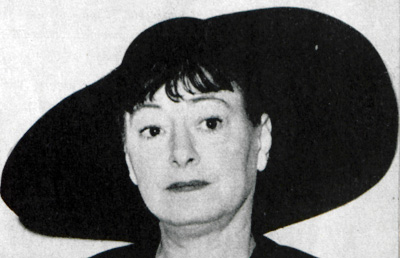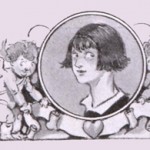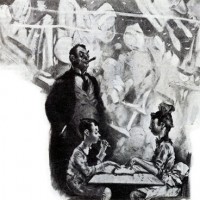She was not the sort of humorist readers expected to find in The Saturday Evening Post. The magazine’s humor tended toward the cleverness of poet Ogden Nash or the nostalgia of Booth Tarkington. Yet Dorothy Parker was often published in the Post, which presented her poetry and her less familiar prose pieces.
Is it the same Dorothy Parker? She of the caustic wit, the rapier tongue, the put-down-from-which-there-is-no-comeback Indeed, reader, it was she. Her pieces appeared in our magazine long before she had established herself as one of America’s sharpest and funniest wits.
Half-Scottish and half-Jewish, Parker was born in 1893 into a tumultuous childhood. Her mother died while Dorothy was still young, and she came to despise her father and stepmother.
She left for New York where she began a promising career at Vanity Fair. She also co-founded the inner circle of a collection of America’s brightest wits at the Round Table of New York’s Algonquin hotel. There she gained respect from the leading writers of the day, and summoned maximum laughter with minimal words, though everyone was wary of suddenly becoming the target of her cynical wit. Another member of the Round Table described her as “a blend of Little Nell and Lady Macbeth.”
Her critical reviews for Vanity Fair were as funny as they were devastating:
Writing of actress Marion Davies, Dorothy said she had “only two expressions, joy and indigestion.”
She said of Katherine Hepburn that her performance ran the gamut of emotions “from A to B.”
In one book review she wrote, “This is not a novel to be tossed aside lightly. It should be thrown with great force.”
She became friends with other Vanity Fair writers: Robert Benchley and Robert Sherwood. These three, according to a 1939 Post article, “brought to Vanity Fair a new wit and alertness, but Condé Nast, its publisher, found himself wondering if, perhaps, these qualities were not being achieved at the sacrifice of others more valuable — office discipline, for instance.
There was the time Nast posted a notice forbidding employees to speculate about one another’s salaries. Immediately, Benchley, Parker & Sherwood splashed “$27.50 per” on huge placards and wore them about their necks.”
When Parker proved too critical in their review, Vanity Fair fired her. She and Benchley rented an office from where they could launch their freelance writing careers.
They took an office in the Metropolitan Opera House — a triangular room with space enough for a table, two chairs and two typewriters. The only other furniture was a gigantic mirror.
Since the room seemed to lack the personal touch, they soaped on the mirror, “Today’s Special; Yankee Pot Roast, 45¢,” hung up a pennant with the word “Spain,” and had a sign painter letter their door:
UTICA DROP FORGE & TOOL CO.
ROBERT BENCHLEY, PRESIDENT
DOROTHY PARKER, PRESIDENT
Their last preparation was to obtain a cable address: “Park-bench.” The firm of Benchley & Parker was ready for business.
Dorothy’s personal life was a roller coaster. She was married three times, twice to the same man. (“I require three things of a man,” she said. “He must be handsome, ruthless, and stupid.”)
She moved to Hollywood with her second (and third) husband Alan Campbell in 1933 and worked in the movie industry. She was nominated for an Academy Award for her work with A Star Is Born.
Her political views made her a target of the government during the Cold War era. She was active in left-wing politics. And when anti-communist sentiment seized Hollywood after World War II, she was blacklisted by the studios where she had worked. Upon her death in 1967, she bequeathed her estate to Martin Luther King Jr.
She wrote several pieces for the Post throughout the 1920s. While you may be familiar with her poetry, her extended prose pieces are little known today.
The prose and poems below are among the scores that were published by the Post:
Men I’m Not Married To
Dorothy Parker could have described millions of American males in her Post article “Men I’m Not Married To,” but she concentrated on just nine men. You might recognize some of these types. (Fellow Round Tabler Franklin P. Adams’ “Women I’m Not Married To” appeared right beside it.)
To a Lady
Lady, pretty lady, delicate and sweet,
Timorous as April, frolicsome as May,
…
As the Spirit Moves
Any day, now, I expect to read in the paper that Sir Oliver Lodge, or somebody else who keeps right in touch with all the old crowd, has received a message from the Great Beyond announcing that the spirits have walked out for a forty-four-hour week, with time and a half for overtime…
Song of the Conventions
We’d dance, with grapes in our wind-tossed hair,
And garments of swirling smoke;
…
Song of the Wilderness
We’ll go out to the open spaces,
Break the web of the morning mist,
…
Become a Saturday Evening Post member and enjoy unlimited access. Subscribe now







Comments
I trust no one, Leishalynn–at least, when it comes to the written word.
“Council” is probably a typo, like the one in “Song of Conventions.” I’m sure “But how would be pay the rent?” should read “But how would we pay the rent?” and I trust Dorothy Parker a lot more than I trust the many semi-literate writers of today, agreeing wholeheartedly with the sentiments in “Grandfather Said It.” Say it again!
The wittiest of all the Algonquin wits.
In her poem, “Grandfather Said It,” however, hard to ignore probable misuse of the word “council.” “Counsel,” I believe, should have been the choice.
Dorothy Parker…my new favorite poet. This story has inspired me to learn more.
A women that dared to be different…
Chopping the satus quo..
complete abandonment
No matter public opinion.
What a trail.
But the pain
Oh the pain.
You did a wonderful potrayal
Of this woman
I so admire her
Thank you for this story